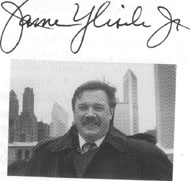 |
Home | Search | Browse | About IPO | Staff | Links |
 |
Home | Search | Browse | About IPO | Staff | Links |
A VIEW FROM CHICAGO

Chicagoans barely give
Springfield a passing glance
by James Ylisela Jr.
And you won't see much in the way of legislation to help the city's schools, labor, minorities or the poor.
Most Chicagoans know who their alderman is, and a few could pick their congressman out of a police lineup. But in many city neighborhoods, the ward superintendent is more of a household name than those folks we send downstate several times a year to do God knows what.
We Chicagoans don't pay much attention to the General Assembly, even when lawmakers are working overtime to deny more money for our public schools.
My first newspaper editor, who found everything about Chicago funny, told me once that the city's political bosses like to send their firstborn sons downstate to be representatives and senators. After the kids reach political puberty, they're allowed to come home to take on more mature responsibility as aldermen.
That's what Richard J. Daley did with his kid. State Sen. Richard M. Daley served several years in state government, developed a reputation as a spoiled prince and then surprised everyone by turning into a pretty good legislator.
But since taking the throne at City Hall, Daley has barely paid Springfield a passing glance. So why should the mayor care who controls the General Assembly?
The short answer is that he probably doesn't. As the state's leading Democrat, Daley made the requisite noise this fall about his party's effort to reclaim the legislature. But that goal meant a lot more to House Minority Leader Michael J. Madigan, who views the speaker's chair as his personal property, just as Daley has always seemed born to the mayorality.
Truth be told, Hizzoner has been doing just fine without any semblance of a state agenda. He's more of a federal guy, making good on his clout with the Clinton Administration and his growing national reputation as a big-city mayor who can get things done. When it comes to job creation, crime prevention and public housing — three basic urban issues — Daley skips Springfield and goes straight to Washington.
In his early years as mayor, Daley floated a few mega-projects in Springfield, such as his plan for a huge casino and entertainment complex. But that went nowhere, and the mayor deserves at least part of the blame for not trying very hard to get it passed. He pulled the plug on his Lake Calumet airport proposal before the Republicans even had a chance to trash it.
Arguably, Daley's most impressive legislative victory came in the summer of 1995, when the Republican-run legislature handed him control of the Chicago Board of Education, something the Democrats under Madigan might never have done.
Daley's indifferent strategy toward Springfield has worked out so far, but the mayor should be careful. Chicago's relationship with the rest of Illinois is changing, and not in the city's favor.
Six years ago, Chicagoans cast nearly one out of every four ballots in the state. The ratio has been dropping ever since, down to less than one in five in 1994, when Republicans won every statewide office and control of both houses of the legislature for the first time in 40 years.
While Chicago has become a big actor on the national stage, in Illinois the city is turning into just another member of the cast.
That's why the General Assembly is going nowhere on rewriting the school funding formula, an issue that requires tough Chicago leadership. And why you won't see much in the way of legislation benefiting labor, minorities or the poor, regardless of who's in charge.
Last month, The Chicago Reporter revealed that the Democratic Party's drive to win some key legislative races was unlikely to have any positive effect on the General Assembly's attitude toward Chicago. Many of those targeted districts are suburban, and any Democrats who managed to get elected are now going to reflect suburban, not urban interests. Many of them sounded more like the Republicans they were trying to replace.
Beholden as they are to Madigan for the money and political acumen he pumped into their campaigns, suburban Democrats aren't going to turn around and start voting for legislation that benefits Chicago.
Unless they dream of one day moving to the city and running for alderman.
James Ylisela Jr. teaches urban reporting at Northwestern University's Medill School of Journalism. He's the consulting editor of The Chicago Reporter.
Illinois Issues November 1996 / 45
|
Sam S. Manivong, Illinois Periodicals Online Coordinator Illinois Periodicals Online (IPO) is a digital imaging project at the Northern Illinois University Libraries funded by the Illinois State Library |